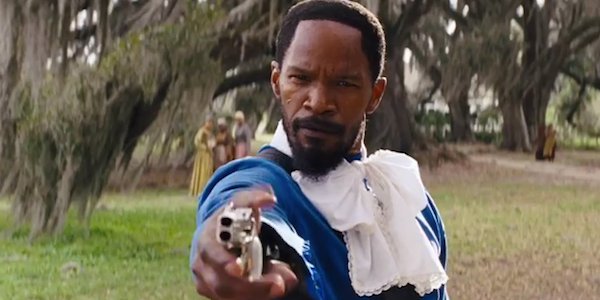4. Use History To Your Advantage (Again)

Inglourious Basterds and Django Unchained are the first movies in what is rumoured to make up Tarantino's "revenge trilogy," though - let's be honest - most of Tarantino's movie are about revenge, anyway, so it's a pretty thin distinction. What both Inglourious and Django share in common, however, is a sense of history lacking in any previous QT works - whereas the first movie dealt with World War II and the Nazi occupation of France in a blunt and incredibly cathartic manner, Django dove head first into America's slavery era. The results weren't subtle. What was noticeable about both of these flicks, however, was that Tarantino's writing felt "enhanced" by the cultural influences inherent to those eras - setting his movies in periods that are long gone took him into new places, and it's safe to say that it was great to see how Tarantino's trademark dialogue could find a place in historical settings. The beauty was that none of it came off as provocative for the sake of it. There's something primally appealing about watching the Basterds gun down Hitler, or Django murder his captors, yes, but it felt justified. If this is to be the third and final flick in the "revenge trilogy," then Tarantino would do right to continue playing on history.
 Inglourious Basterds and Django Unchained are the first movies in what is rumoured to make up Tarantino's "revenge trilogy," though - let's be honest - most of Tarantino's movie are about revenge, anyway, so it's a pretty thin distinction. What both Inglourious and Django share in common, however, is a sense of history lacking in any previous QT works - whereas the first movie dealt with World War II and the Nazi occupation of France in a blunt and incredibly cathartic manner, Django dove head first into America's slavery era. The results weren't subtle. What was noticeable about both of these flicks, however, was that Tarantino's writing felt "enhanced" by the cultural influences inherent to those eras - setting his movies in periods that are long gone took him into new places, and it's safe to say that it was great to see how Tarantino's trademark dialogue could find a place in historical settings. The beauty was that none of it came off as provocative for the sake of it. There's something primally appealing about watching the Basterds gun down Hitler, or Django murder his captors, yes, but it felt justified. If this is to be the third and final flick in the "revenge trilogy," then Tarantino would do right to continue playing on history.
Inglourious Basterds and Django Unchained are the first movies in what is rumoured to make up Tarantino's "revenge trilogy," though - let's be honest - most of Tarantino's movie are about revenge, anyway, so it's a pretty thin distinction. What both Inglourious and Django share in common, however, is a sense of history lacking in any previous QT works - whereas the first movie dealt with World War II and the Nazi occupation of France in a blunt and incredibly cathartic manner, Django dove head first into America's slavery era. The results weren't subtle. What was noticeable about both of these flicks, however, was that Tarantino's writing felt "enhanced" by the cultural influences inherent to those eras - setting his movies in periods that are long gone took him into new places, and it's safe to say that it was great to see how Tarantino's trademark dialogue could find a place in historical settings. The beauty was that none of it came off as provocative for the sake of it. There's something primally appealing about watching the Basterds gun down Hitler, or Django murder his captors, yes, but it felt justified. If this is to be the third and final flick in the "revenge trilogy," then Tarantino would do right to continue playing on history.